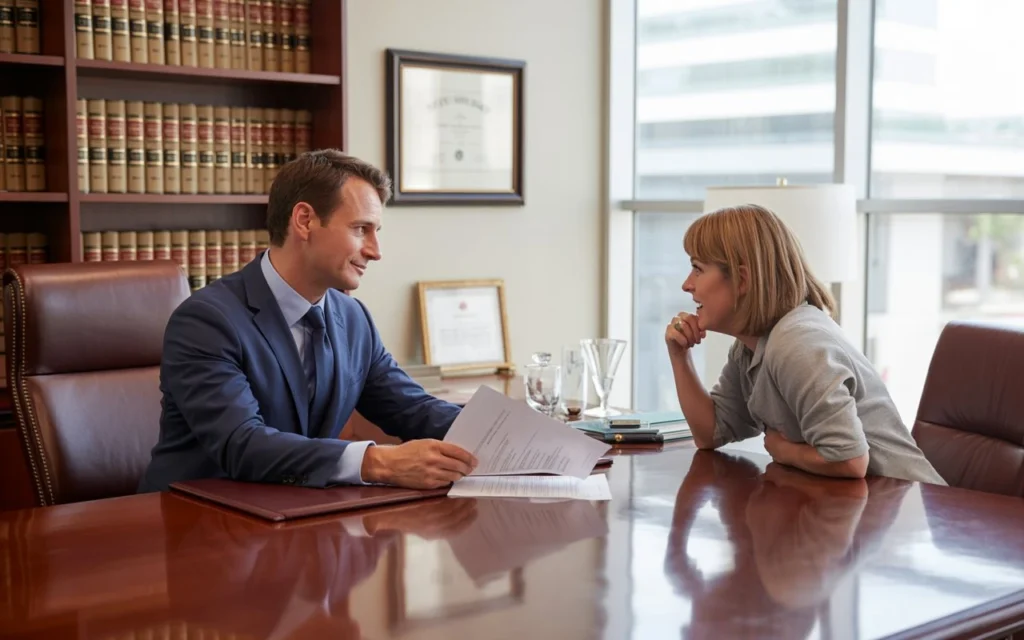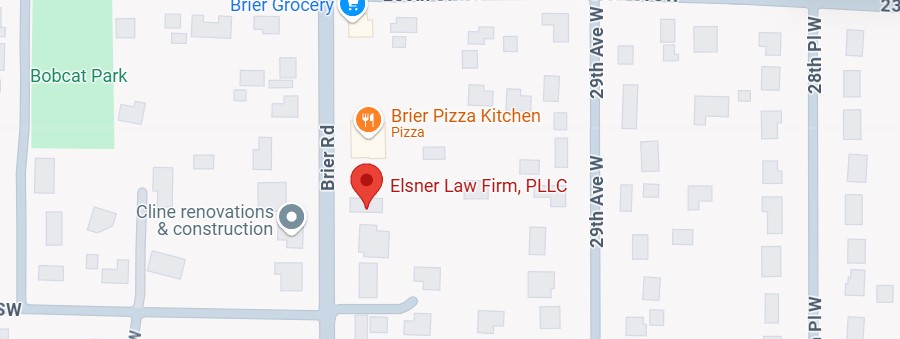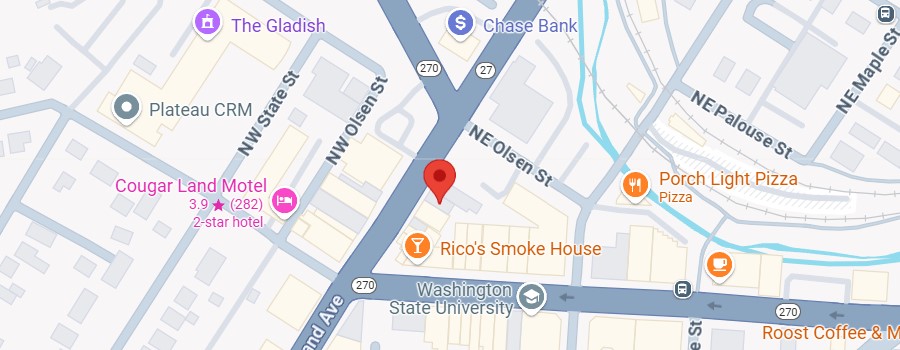The Three Stages of a Collision in a Car Crash
The three stages of a collision happen in every car crash: the vehicle collision, the human collision, and the internal collision. They can unfold in milliseconds, and they explain why you can walk away from a “minor” crash, then feel worse later.
If you are driving in Seattle, Tacoma, Bellevue, Everett, or anywhere in Washington, a crash can bring fast pressure, ER bills, missed pay, and repair costs that climb after teardown. If you are struggling with these bills, a Car Accident Lawyer Seattle can help you navigate the recovery process. This page breaks down what happens in the body and the vehicle, and why seat belts and airbags change outcomes.
How Many Distinct Parts Make Up a Vehicle Collision?
How many distinct parts is a vehicle collision made up of? Three. The three parts occur back-to-back.
-
Vehicle collision: the car hits another vehicle or object and starts to slow.
-
Human collision: occupants keep moving and strike the belt, airbag, seat, dash, or glass.
-
Internal collision: organs keep moving inside the body after the torso slows.
These three parts help explain injury risk in low-speed crashes and high-speed crashes. Restraints matter at every stage. In passenger cars, seat belts reduce the risk of fatal injury by 45% and moderate-to-critical injury by 50%.
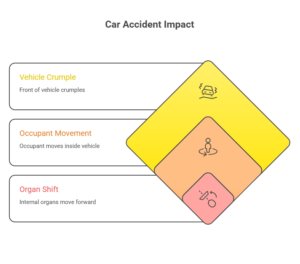
The Three Stages of a Collision Explained
What are the three stages of a collision?
They include:
-
Vehicle collision: the vehicle strikes something and decelerates fast.
-
Human collision: the person strikes the inside of the vehicle or the restraint system.
-
Internal collision: organs strike bone or other organs.
The three stages of a collision include different injury patterns because different things “stop” at different times. A bumper can crumple while the body keeps moving. That mismatch is why a crash that looks mild can still cause neck pain, back pain, headache, or dizziness.
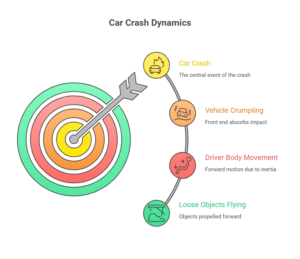
What Happens in the First Tenth of a Second During a Collision
In the first tenth of a second in a collision, the vehicle and everything inside are going at the same speed they were going a moment earlier. Then the vehicle begins to slow.
-
The vehicle structure starts to crush and absorb energy.
-
Unrestrained occupants keep moving forward.
-
Loose items keep moving forward.
That is why phones, water bottles, laptops, and tools can become projectiles. This split-second physics is also why a seat belt needs to be on before a crash starts. Knowing what to do after an accident is vital, as the first few seconds determine both your safety and your legal rights.
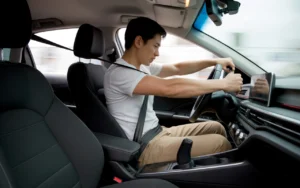
Understanding the Second Collision: The Human Impact
In a crash the second collision refers to the occupant hitting the interior or restraint system after the vehicle begins to decelerate. The car slows first. The body keeps moving at the original speed until something stops it.
This is why people say the second crash is the crash that injures the occupants of a motor vehicle.
Common contact points in the human collision:
-
Seat belt and belt anchor points
-
Airbag
-
Steering wheel and dashboard
-
Windshield or side glass
-
Front seat back for rear passengers
Seat belts and airbags work as a pair. Seat belts manage forward motion and reduce ejection risk. Airbags help cushion contact and spread force across a larger area. Seat belts alone reduce fatal injury risk by 45% in passenger cars.
The Third Collision: Internal Organ Damage Explained
What is the third collision in a crash?
It is the internal collision. It happens inside the body.
During the third collision, the torso may stop, but organs can keep moving and strike:
-
The rib cage
-
The spine
-
The skull
-
Other organs
This stage can cause injuries that are not obvious at the scene, including traumatic brain injuries from cars, internal bleeding, organ bruising, and spinal cord damage. Symptoms may start later. Watch for worsening headache, confusion, vomiting, fainting, chest pain, belly pain, weakness, or numbness. If these show up, seek medical care immediately following the incident to ensure hidden injuries are diagnosed.
Types of Vehicle Collisions and Their Injury Patterns
These types of collision show up most often on Washington roads:
- Rear-end collisions: neck strain and whiplash are common. A Rear End Collision Lawyer Seattle can help if you’ve been hit from behind.
- Head-on collisions: higher risk of chest, leg, and multi-system trauma. A Head-On Collision Lawyer Seattle is essential for these high-impact cases.
-
Side-impact (T-bone) collisions: rib, pelvis, shoulder, and head injuries on the struck side.
-
Sideswipe collisions: neck and shoulder strain, plus loss-of-control risk.
-
Rollover crashes: multiple impacts, higher head and neck risk, higher ejection risk when unbelted.
Different directions of force change which body parts take the load. That is why injury severity can vary even at similar speeds. It is important to understand rear end vehicle damage and how it correlates to the forces exerted on the human body.
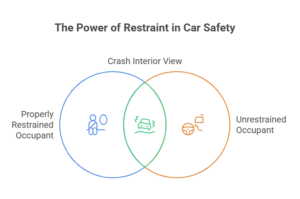
The Role of Seatbelts and Airbags in the Three Collisions
Seat belts and airbags mainly reduce harm in the human collision, and they also reduce harm in the internal collision by lowering peak forces.
Key safety facts:
-
Seat belts reduce front-seat passenger car fatal injury risk by 45% and moderate-to-critical injury risk by 50%.
-
Frontal airbags have saved more than 50,000 lives over about 30 years.
-
The combination of seat belts and airbags reduces fatality risk by 61% compared with an unbelted occupant in a vehicle without airbags.
Practical reminder: the shoulder belt should lie across the chest and shoulder, not under the arm or behind the back. A belt in the wrong place can raise injury risk.
How Car Crashes Absorb Impact Force
In a motor vehicle crash, as a car crushes, it absorbs some of the force of the collision. Vehicles are designed to crumple in a controlled way to add time to deceleration.
NHTSA explains the core idea: the front end is designed to crumple to give occupants additional time to decelerate, which lowers crash forces on the occupant.
This is the reason modern crash structures focus on:
-
Controlled deformation in the front and rear
-
A stronger passenger compartment
-
Better restraint systems inside the cabin
Legal Support After a Crash in Washington
A crash can create immediate money pressure. Ambulance bills, imaging, missed work, and repair costs add up fast. If you are dealing with an insurance adjuster, keep your statement short and factual. Why insurance is not always on your side is a critical concept to grasp before signing any settlement papers. Keep your medical records, bills, and photos in one place.
Frequently Asked Questions
What are the 3 types of collisions in a car crash?
The three types of collisions are the vehicle collision (car strikes object), human collision (occupant strikes vehicle interior), and internal collision (organs strike bones/skull). These three collisions happen in milliseconds during every crash, each creating distinct injury risks that explain why even minor accidents can cause serious harm.
How many distinct parts is a vehicle collision made up of?
A vehicle collision is made up of three distinct parts: the vehicle impact, the human impact, and the internal organ impact. Each part occurs in rapid succession, typically within one-tenth of a second, creating a chain reaction of forces that determine injury severity and occupant survival rates.
What are the three stages of a collision?
The three stages include vehicle collision when cars strike objects, human collision when occupants hit interior surfaces, and internal collision when organs impact skeletal structures. Understanding these stages explains why restraint systems are critical and why injuries often worsen without proper seatbelt and airbag use during crashes.
What is the second collision in a crash?
The second collision is the human collision, occurring when unrestrained occupants strike the steering wheel, dashboard, or windshield after the vehicle stops. This collision causes most visible injuries including broken bones, head trauma, and chest injuries, which seatbelts and airbags help prevent by controlling occupant movement.
What happens during the third collision in a motor vehicle crash?
During the third collision, internal organs continue moving forward and strike bones, the skull, or other organs even after the body stops. This invisible collision causes traumatic brain injury, internal bleeding, organ damage, and spinal cord injuries that may not show symptoms immediately but require urgent medical attention.
What happens in the first tenth of a second in a collision?
In the first tenth of a second, the vehicle begins decelerating while everything inside continues moving at the original speed due to inertia. The front end crushes to absorb energy while unrestrained occupants and loose objects maintain forward momentum, creating the dangerous conditions that lead to the second and third collisions.
What are the types of collisions?
Common collision types include rear-end, head-on, side-impact (T-bone), sideswipe, and rollover crashes. Each type creates unique injury patterns based on impact direction, with head-on and side-impact collisions typically causing the most severe injuries due to minimal vehicle protection in those areas.
What is the human collision?
The human collision is the second stage when occupants strike vehicle interior surfaces after the car stops but their bodies continue moving forward. This collision causes visible injuries like fractures, lacerations, and head trauma, emphasizing why seatbelts are essential for preventing ejection and reducing impact severity.
What is internal collision?
Internal collision is the third stage when organs inside the body strike bones or other organs due to continued forward momentum. This collision causes life-threatening injuries including brain trauma, internal bleeding, organ rupture, and spinal damage that often have delayed symptoms requiring immediate medical evaluation after any crash.
How does a car crash absorb force?
Car crashes absorb force through engineered crumple zones that deform during impact, converting kinetic energy into structural deformation rather than transferring it to occupants. This controlled crushing extends deceleration time, reducing peak forces and lowering injury severity while maintaining passenger compartment integrity for occupant protection.
What is the three collision concept?
The three collision concept explains that every crash involves three separate impacts: vehicle strikes object, occupant strikes interior, and organs strike skeletal system. This concept helps drivers understand why you should hire an attorney to ensure all three stages of impact are properly accounted for in your claim.
What are the three stages of a collision include?
The three stages include the initial vehicle impact when cars strike objects, the human impact when occupants collide with interior surfaces, and the internal impact when organs collide with bones. Each stage presents unique injury risks, with the third stage often causing the most serious but least visible damage to vital organs.
Conclusion
The three types of collisions in a crash happen fast, but the effects can last for weeks or months. Vehicle damage does not always match the injury. Symptoms can rise later, and internal injuries can be hard to spot without a medical exam. If you were in a crash in Seattle or anywhere in Washington, protect yourself by getting checked, saving your records, and keeping your statement to insurance simple and factual. Book your free consult with Elsner Law Firm at 206-447-1425.
